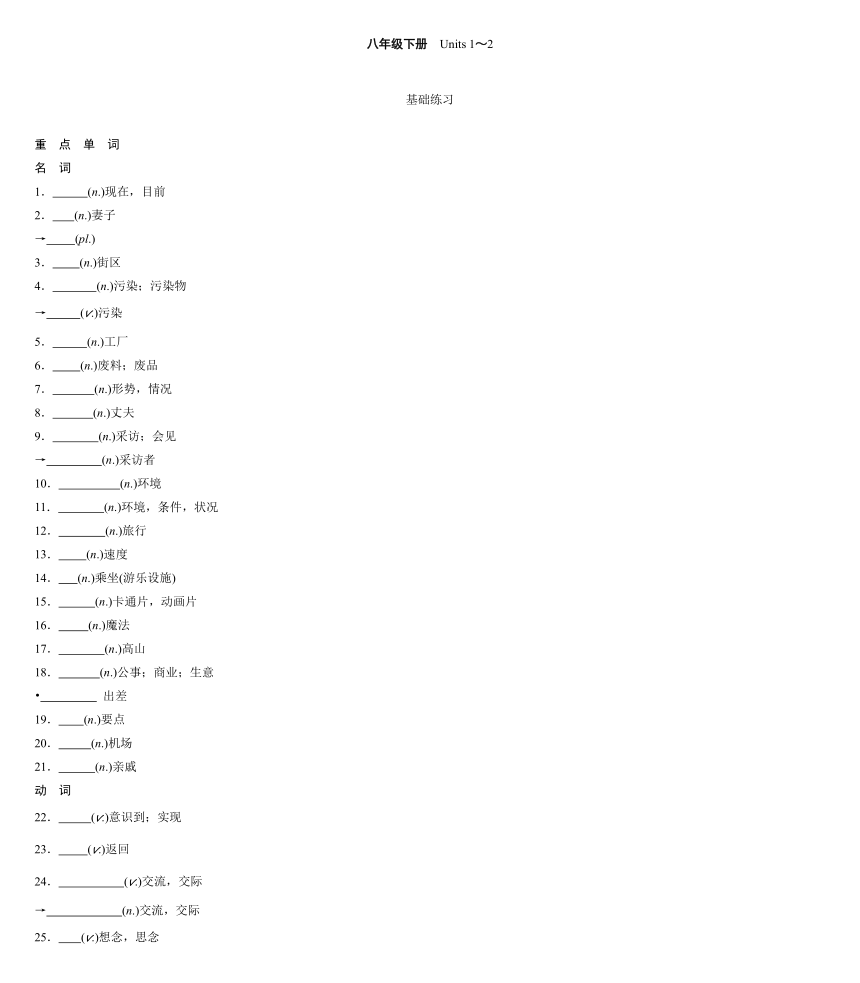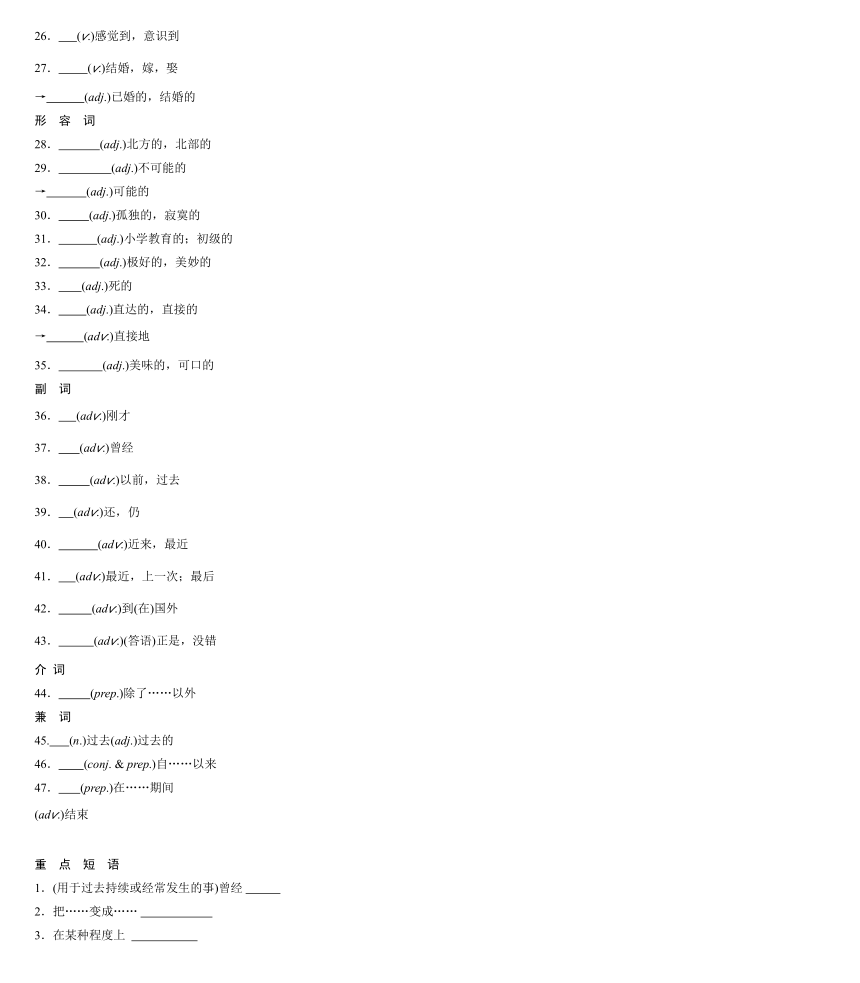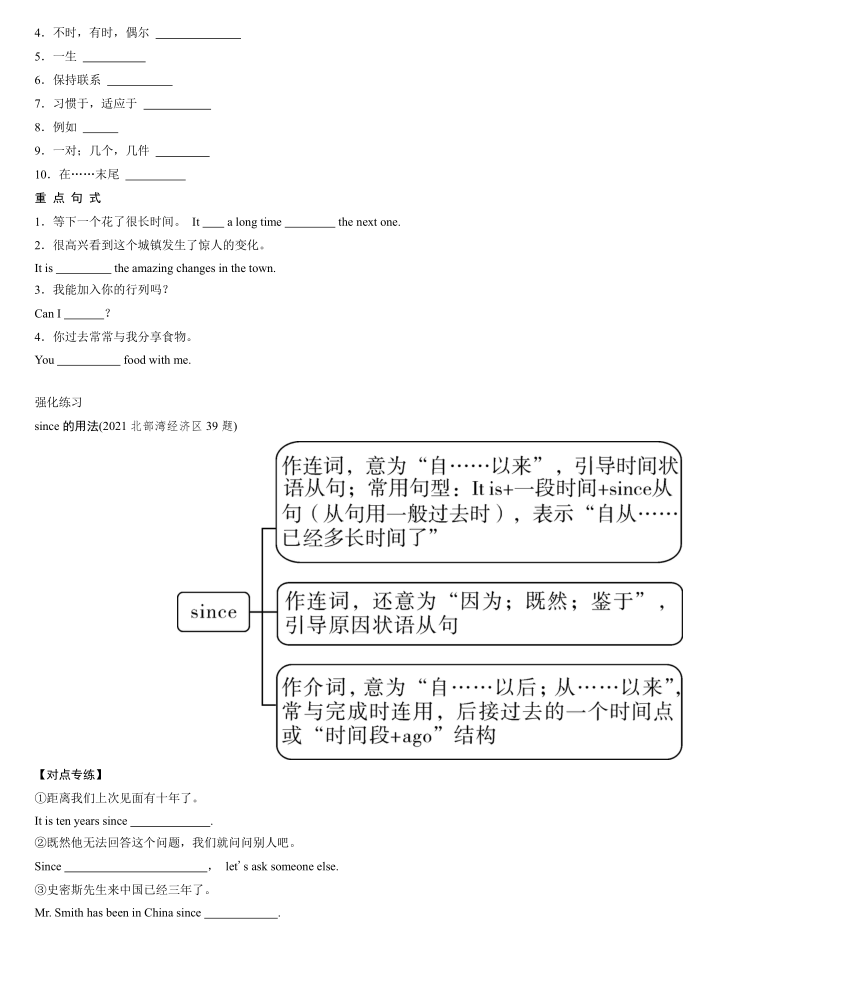八年级下册Units 1~2 课后练习 2024年广西英语译林版中考总复习(含答案)
文档属性
| 名称 | 八年级下册Units 1~2 课后练习 2024年广西英语译林版中考总复习(含答案) |  | |
| 格式 | docx | ||
| 文件大小 | 58.4KB | ||
| 资源类型 | 教案 | ||
| 版本资源 | 牛津译林版 | ||
| 科目 | 英语 | ||
| 更新时间 | 2024-05-21 19:26:25 | ||
图片预览



文档简介
八年级下册 Units 1~2
基础练习
重 点 单 词
名 词
1.present(n.)现在,目前
2.wife(n.)妻子
→wives(pl.)
3.block(n.)街区
4.pollution(n.)污染;污染物
→pollute(v.)污染
5.factory(n.)工厂
6.waste(n.)废料;废品
7.situation(n.)形势,情况
8.husband(n.)丈夫
9.interview(n.)采访;会见
→interviewer(n.)采访者
10.environment(n.)环境
11.condition(n.)环境,条件,状况
12.travelling(n.)旅行
13.speed(n.)速度
14.ride(n.)乘坐(游乐设施)
15.cartoon(n.)卡通片,动画片
16.magic(n.)魔法
17.mountain(n.)高山
18.business(n.)公事;商业;生意
on business 出差
19.point(n.)要点
20.airport(n.)机场
21.relative(n.)亲戚
动 词
22.realize(v.)意识到;实现
23.return(v.)返回
24.communicate(v.)交流,交际
→communication(n.)交流,交际
25.miss(v.)想念,思念
26.feel(v.)感觉到,意识到
27.marry(v.)结婚,嫁,娶
→married(adj.)已婚的,结婚的
形 容 词
28.northern(adj.)北方的,北部的
29.impossible(adj.)不可能的
→possible(adj.)可能的
30.lonely(adj.)孤独的,寂寞的
31.primary(adj.)小学教育的;初级的
32.fantastic(adj.)极好的,美妙的
33.dead(adj.)死的
34.direct(adj.)直达的,直接的
→directly(adv.)直接地
35.delicious(adj.)美味的,可口的
副 词
36.just(adv.)刚才
37.ever(adv.)曾经
38.before(adv.)以前,过去
39.yet(adv.)还,仍
40.recently(adv.)近来,最近
41.last(adv.)最近,上一次;最后
42.abroad(adv.)到(在)国外
43.exactly(adv.)(答语)正是,没错
介 词
44.except(prep.)除了……以外
兼 词
45.past(n.)过去(adj.)过去的
46.since(conj. & prep.)自……以来
47.over(prep.)在……期间
(adv.)结束
重 点 短 语
1.(用于过去持续或经常发生的事)曾经used to
2.把……变成…… turn … into …
3.在某种程度上 in some ways
4.不时,有时,偶尔 from time to time
5.一生 all one's life
6.保持联系 keep in touch
7.习惯于,适应于 be/get used to
8.例如 such as
9.一对;几个,几件 a couple of
10.在……末尾 at the end of
重 点 句 式
1.等下一个花了很长时间。 It took a long time to wait for the next one.
2.很高兴看到这个城镇发生了惊人的变化。
It is good to see the amazing changes in the town.
3.我能加入你的行列吗?
Can I join you?
4.你过去常常与我分享食物。
You used to share food with me.
强化练习
since的用法(2021北部湾经济区39题)
【对点专练】
①距离我们上次见面有十年了。
It is ten years since we met last time.
②既然他无法回答这个问题,我们就问问别人吧。
Since he can't answer this question, let's ask someone else.
③史密斯先生来中国已经三年了。
Mr. Smith has been in China since three years ago.
辨析lonely与alone (2022北部湾经济区48题)
lonely 形容词 指情感上“孤独的,寂寞的”,具有感彩;也可表示地方“荒凉的”
alone 副词 意为“独自地”,指数量上就一个,不具有感彩
形容词 意为“独自的;单独的”,只作表语
【对点专练】
lonely alone
I am walking alone in the lonely mountains. I don't feel lonely though I am alone.
辨析how long, how often, how soon与how many times
how long “多长时间”,回答时用for或since引导的时间状语
how often “多久一次”,指动作发生的频率,回答时常用once a week, twice a month, sometimes等
how soon “还要多久才……”,常用于一般将来时,回答时用in引导的时间状语
how many times “多少次”,用于询问次数,回答时常用once, twice, three times等
【对点专练】
①—How soon will they arrive here
— ten minutes.( B )
A.Since
B.In
C.For
②— have you learnt English
—For three years.( C )
A.How often
B.How soon
C.How long
③—How many times have you been to Beijing
— .( A )
A.Twice
B.Twice a year
C.In two years
辨析except, besides与except for
except “除了……以外”,强调所排除的不包括在内,含有“减去”的意思
besides “除了……之外(还有……)”,包括besides后面的宾语在内,含有“加上”的意思
except for “除了”,说明整个基本情况之后,对细节加以修正,常含有“美中不足”之意
注意:由except连接的并列成分作主语时,谓语动词的单复数应与前面的成分保持一致。如:No one except these two girls was late for class.,【对点专练】
except besides except for
①I have another pen besides this black one.
②They all went to the zoo except Tom, because he was ill.
③His homework is very good except for his bad handwriting(字迹).
语法练习
现在完成时(2018北部湾经济区37题)
( B )1.(2023云南改编)— you about Naxi Ancient Music yet?
—Yes, I have. It is a part of Naxi culture.
A.Has; heard
B.Have; heard
C.Did; hear
( A )2.(2023扬州改编)The children since they could first pick up a brush.
A.have painted
B.painted
C.paint
( B )3.(2023达州改编)—Hi, Lily, you ever of Zibo, a city in the center of Shandong Province, is known for its barbecue these days
—Sure. I expect to visit it and have a taste of the special food.
A.has; heard
B.have; heard
C.do; hear
( B )4.(2023云南改编)He many times, but he never loses heart.
A.fails
B.has failed
C.failed
( C )5.(2023扬州改编)I China for three months and this is the first time I've tried on hanfu.
A.have gone to
B.have been to
C.have been in
写出下列黑体单词的熟义并根据语境选出最佳生义。
1.waste
熟义:(n.)浪费
(n.)废料;废品
生义:A.(n.)垃圾
B.(adj.)荒芜的;废弃的
( B )(1)They are turning waste land into fields.
( A )(2)You should put waste in the dustbin.
2.point
熟义:(v.)指向
(n.)①分数 ②要点
生义:A.(n.)观点,看法
B.(v.)指路;指点
( B )(1)I wonder if you could point me in the right direction for the bus station.
( A )(2)My point is that he is right.
提能练习
一、根据语境或提示,完成句子。
1.Jack took the dog for a walk around the block(街区) and then went back home.
2.We are happy to know that all the people are in good condition(状况) after the storm.
3.My father works very hard. He returns home from work very late every night.
4.The seafood is so delicious(美味的) that I can't stop eating it.
5.We'd better hurry to the airport because the plane will take off.
二、用括号内所给单词的适当形式填空。
1.I moved to the northern(north) part of the town after I found a job there.
2.Air pollution(pollute) has become a serious problem which does harm to our health.
3.Has your father been to Nanjing on business recently(recent)
4.It is important to have good communication(communicate) with people around you.
5.They are going to take a direct flight(fly) to New York.
三、小语篇特训。(教材链接:译林版八年级下册Unit 2 Reading A改编)
speed take fantastic watch character
Kitty and her parents have been in Hong Kong for two days. They're having a 1.fantastic time there. Today they spent the whole day at Disneyland.
First, they had fun on Space Mountain — an indoor roller coaster in the dark. It moved at high 2.speed and was really exciting! Next, they hurried to a restaurant to have a quick meal. On the way, they met some Disney cartoon 3.characters. Everybody got excited when a parade of Disney characters began later in the afternoon. Kitty ran after them and couldn't stop 4.taking photos. After that, they watched a 4-D film. Then they did some shopping. At the end of the day, they 5.watched the fireworks in front of Sleeping Beauty Castle.
选词填空(2023苏州改编)
plants I piece but dance small see just time freely
Dancing with the Light
A few years ago, I visited the Classical Gardens of Suzhou. During the visit, my attention was drawn away from the 1.plants,bridges and stones, towards the walls of the gardens. Mostly white, some parts of the walls are losing 2.pieces of their covering. This creates space in which light and plants can be 3.seen. The walls are not only the boundaries of the gardens, 4.but they also form protected paths that guide you on a trip.
The memory of the white walls stayed with 5.me. I kept imagining how many shadows(影) could be collected by them to 6.dance with the light. This fantastic moment was so lively that I came back to explore it with my camera.
Working 7. freely with these walls and their marks, I began to feel like collecting all the stories that were painted there. Weather and 8. time have turned these amazing white walls into Chinese landscape paintings.
I took the photos during the month of June, 9. just after the rain. The air was full of 10. small drops of water, showing the light and the colour of the things around. As colour was born out of a dance between light and a body, when photographing in colour I found myself enjoying a moment of this dance.
基础练习
重 点 单 词
名 词
1.present(n.)现在,目前
2.wife(n.)妻子
→wives(pl.)
3.block(n.)街区
4.pollution(n.)污染;污染物
→pollute(v.)污染
5.factory(n.)工厂
6.waste(n.)废料;废品
7.situation(n.)形势,情况
8.husband(n.)丈夫
9.interview(n.)采访;会见
→interviewer(n.)采访者
10.environment(n.)环境
11.condition(n.)环境,条件,状况
12.travelling(n.)旅行
13.speed(n.)速度
14.ride(n.)乘坐(游乐设施)
15.cartoon(n.)卡通片,动画片
16.magic(n.)魔法
17.mountain(n.)高山
18.business(n.)公事;商业;生意
on business 出差
19.point(n.)要点
20.airport(n.)机场
21.relative(n.)亲戚
动 词
22.realize(v.)意识到;实现
23.return(v.)返回
24.communicate(v.)交流,交际
→communication(n.)交流,交际
25.miss(v.)想念,思念
26.feel(v.)感觉到,意识到
27.marry(v.)结婚,嫁,娶
→married(adj.)已婚的,结婚的
形 容 词
28.northern(adj.)北方的,北部的
29.impossible(adj.)不可能的
→possible(adj.)可能的
30.lonely(adj.)孤独的,寂寞的
31.primary(adj.)小学教育的;初级的
32.fantastic(adj.)极好的,美妙的
33.dead(adj.)死的
34.direct(adj.)直达的,直接的
→directly(adv.)直接地
35.delicious(adj.)美味的,可口的
副 词
36.just(adv.)刚才
37.ever(adv.)曾经
38.before(adv.)以前,过去
39.yet(adv.)还,仍
40.recently(adv.)近来,最近
41.last(adv.)最近,上一次;最后
42.abroad(adv.)到(在)国外
43.exactly(adv.)(答语)正是,没错
介 词
44.except(prep.)除了……以外
兼 词
45.past(n.)过去(adj.)过去的
46.since(conj. & prep.)自……以来
47.over(prep.)在……期间
(adv.)结束
重 点 短 语
1.(用于过去持续或经常发生的事)曾经used to
2.把……变成…… turn … into …
3.在某种程度上 in some ways
4.不时,有时,偶尔 from time to time
5.一生 all one's life
6.保持联系 keep in touch
7.习惯于,适应于 be/get used to
8.例如 such as
9.一对;几个,几件 a couple of
10.在……末尾 at the end of
重 点 句 式
1.等下一个花了很长时间。 It took a long time to wait for the next one.
2.很高兴看到这个城镇发生了惊人的变化。
It is good to see the amazing changes in the town.
3.我能加入你的行列吗?
Can I join you?
4.你过去常常与我分享食物。
You used to share food with me.
强化练习
since的用法(2021北部湾经济区39题)
【对点专练】
①距离我们上次见面有十年了。
It is ten years since we met last time.
②既然他无法回答这个问题,我们就问问别人吧。
Since he can't answer this question, let's ask someone else.
③史密斯先生来中国已经三年了。
Mr. Smith has been in China since three years ago.
辨析lonely与alone (2022北部湾经济区48题)
lonely 形容词 指情感上“孤独的,寂寞的”,具有感彩;也可表示地方“荒凉的”
alone 副词 意为“独自地”,指数量上就一个,不具有感彩
形容词 意为“独自的;单独的”,只作表语
【对点专练】
lonely alone
I am walking alone in the lonely mountains. I don't feel lonely though I am alone.
辨析how long, how often, how soon与how many times
how long “多长时间”,回答时用for或since引导的时间状语
how often “多久一次”,指动作发生的频率,回答时常用once a week, twice a month, sometimes等
how soon “还要多久才……”,常用于一般将来时,回答时用in引导的时间状语
how many times “多少次”,用于询问次数,回答时常用once, twice, three times等
【对点专练】
①—How soon will they arrive here
— ten minutes.( B )
A.Since
B.In
C.For
②— have you learnt English
—For three years.( C )
A.How often
B.How soon
C.How long
③—How many times have you been to Beijing
— .( A )
A.Twice
B.Twice a year
C.In two years
辨析except, besides与except for
except “除了……以外”,强调所排除的不包括在内,含有“减去”的意思
besides “除了……之外(还有……)”,包括besides后面的宾语在内,含有“加上”的意思
except for “除了”,说明整个基本情况之后,对细节加以修正,常含有“美中不足”之意
注意:由except连接的并列成分作主语时,谓语动词的单复数应与前面的成分保持一致。如:No one except these two girls was late for class.,【对点专练】
except besides except for
①I have another pen besides this black one.
②They all went to the zoo except Tom, because he was ill.
③His homework is very good except for his bad handwriting(字迹).
语法练习
现在完成时(2018北部湾经济区37题)
( B )1.(2023云南改编)— you about Naxi Ancient Music yet?
—Yes, I have. It is a part of Naxi culture.
A.Has; heard
B.Have; heard
C.Did; hear
( A )2.(2023扬州改编)The children since they could first pick up a brush.
A.have painted
B.painted
C.paint
( B )3.(2023达州改编)—Hi, Lily, you ever of Zibo, a city in the center of Shandong Province, is known for its barbecue these days
—Sure. I expect to visit it and have a taste of the special food.
A.has; heard
B.have; heard
C.do; hear
( B )4.(2023云南改编)He many times, but he never loses heart.
A.fails
B.has failed
C.failed
( C )5.(2023扬州改编)I China for three months and this is the first time I've tried on hanfu.
A.have gone to
B.have been to
C.have been in
写出下列黑体单词的熟义并根据语境选出最佳生义。
1.waste
熟义:(n.)浪费
(n.)废料;废品
生义:A.(n.)垃圾
B.(adj.)荒芜的;废弃的
( B )(1)They are turning waste land into fields.
( A )(2)You should put waste in the dustbin.
2.point
熟义:(v.)指向
(n.)①分数 ②要点
生义:A.(n.)观点,看法
B.(v.)指路;指点
( B )(1)I wonder if you could point me in the right direction for the bus station.
( A )(2)My point is that he is right.
提能练习
一、根据语境或提示,完成句子。
1.Jack took the dog for a walk around the block(街区) and then went back home.
2.We are happy to know that all the people are in good condition(状况) after the storm.
3.My father works very hard. He returns home from work very late every night.
4.The seafood is so delicious(美味的) that I can't stop eating it.
5.We'd better hurry to the airport because the plane will take off.
二、用括号内所给单词的适当形式填空。
1.I moved to the northern(north) part of the town after I found a job there.
2.Air pollution(pollute) has become a serious problem which does harm to our health.
3.Has your father been to Nanjing on business recently(recent)
4.It is important to have good communication(communicate) with people around you.
5.They are going to take a direct flight(fly) to New York.
三、小语篇特训。(教材链接:译林版八年级下册Unit 2 Reading A改编)
speed take fantastic watch character
Kitty and her parents have been in Hong Kong for two days. They're having a 1.fantastic time there. Today they spent the whole day at Disneyland.
First, they had fun on Space Mountain — an indoor roller coaster in the dark. It moved at high 2.speed and was really exciting! Next, they hurried to a restaurant to have a quick meal. On the way, they met some Disney cartoon 3.characters. Everybody got excited when a parade of Disney characters began later in the afternoon. Kitty ran after them and couldn't stop 4.taking photos. After that, they watched a 4-D film. Then they did some shopping. At the end of the day, they 5.watched the fireworks in front of Sleeping Beauty Castle.
选词填空(2023苏州改编)
plants I piece but dance small see just time freely
Dancing with the Light
A few years ago, I visited the Classical Gardens of Suzhou. During the visit, my attention was drawn away from the 1.plants,bridges and stones, towards the walls of the gardens. Mostly white, some parts of the walls are losing 2.pieces of their covering. This creates space in which light and plants can be 3.seen. The walls are not only the boundaries of the gardens, 4.but they also form protected paths that guide you on a trip.
The memory of the white walls stayed with 5.me. I kept imagining how many shadows(影) could be collected by them to 6.dance with the light. This fantastic moment was so lively that I came back to explore it with my camera.
Working 7. freely with these walls and their marks, I began to feel like collecting all the stories that were painted there. Weather and 8. time have turned these amazing white walls into Chinese landscape paintings.
I took the photos during the month of June, 9. just after the rain. The air was full of 10. small drops of water, showing the light and the colour of the things around. As colour was born out of a dance between light and a body, when photographing in colour I found myself enjoying a moment of this dance.
同课章节目录
